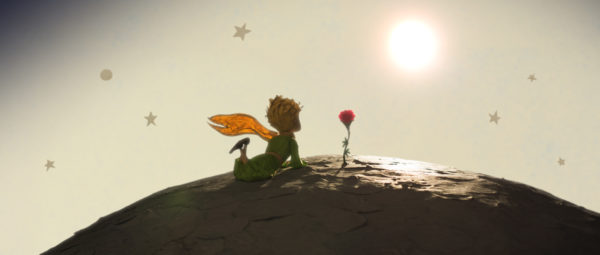To travel through the stars and fly an antique airplane; to escape from the doldrum noises of life, discover friendship, and struggle to keep it; and through it all to grow in love and happiness, what more can one want out of a summer film? This summer, the Netflix release of The Little Prince brought us exactly this.
The film is not a simple adaptation of Saint-Exupéry’s classic book. Rather, it tells the story of a Little Girl. Her mother and her society are forming this Girl into an efficient, hard-working member of the grown-up world. Her life is swamped with chore after chore, relentless study, and obsessive time-management. She—and they—have no time for play, friendship, and the joys of childhood. This all begins to change when her quirky old neighbor, the Aviator, throws a paper airplane through her window. There she finds the first pages of a marvelous story of a Little Prince from outer space. From this moment on, the two stories (the new “frame” narrative, and the original) begin to intertwine. Through her relationship with the Aviator, who shares his past encounters with his peculiar friend from asteroid B 612, Little Girl discovers how to be a child. She learns to see that there is much more to life than what the materialistic, efficient, and status-driven adult world has to offer.
The film remains very faithful to the spirit of Saint-Exupéry’s story. Like the book, it explores the malaise of the grown-up world and finds its remedy in childhood. Those of you who have read the book will remember the Little Prince’s puzzlement at the absurdities of adult life, of its ambition, of its ugliness, of its apparent meaninglessness. The movie’s portrayal of the neighborhood where the Girl lives—gray, linear, and mass-produced—communicates that well. It’s troubling to see how the anxieties of a self-driven, successful and sad society (like ours) can consume a child’s life. First, the movie warns us about the dangers of losing sight of the joys of childhood. Then, through the character of the Aviator, his colorful house, eccentric personality and adventurous stories, the film presents an attractive alternative. In this new world, the Girl can, for the first time, make a friend, and so begin to see reality through the eyes of love.
The most visually delightful parts of the film are those that relate the story of the Little Prince. The animation shifts from being a rather conventional, contemporary cartoon, to something totally different. In these parts of the movie, the images recall Saint-Exupéry’s own from the book. The figures seem to be made of paper and are bathed in light. And in these scenes, the old encounters are remembered—of the Prince loving his rose, asking for drawings of a goat, and making friends with the fox. I thank the filmmakers for their charming recreation of the original story through these moments in the movie.
The rest of the film (i.e., the frame story) is not all it could be, and becomes perhaps too complex (see Jeffrey Overstreet’s review). Despite this, I truly enjoyed it. I am thankful for having seen a beautiful and thoughtful animated movie. I am especially grateful to the director, the actors, and the animators who through the film shared with us a lively reading of one of my favorite stories. In the film we see how the Little Girl meets and befriends the Aviator through his tales and then, with their help, grows into a joyful and loving child. This suggests that the filmmakers, at least the director Mark Osborne, have interiorized the insights of Saint-Exupéry’s book. They have seen some of the essential. Their film testifies to the vitality this literary classic still may have. So I hope that those who watch this movie will turn to the book and find in it an old or new friend, with many riches to share. Then, through the aid of both book and film, we can all remember that it is only in learning to be little children that we can be truly happy, and that what is essential is visible only to the loving heart.
[The movie was directed by Mark Osborne and features the voices of Jeff Bridges (the Aviator), Mackenzie Foy (the Little Girl), Riley Osborne (the Little Prince), and James Franco (the Fox) among others. Hans Zimmer and Richard Harvey wrote its beautiful soundtrack. It was released this summer as a Netflix exclusive and can be found there. Its Motion Picture Rating is PG. A trailer can be found here.]
✠







